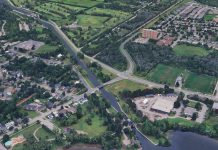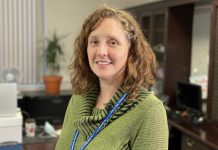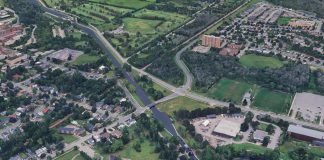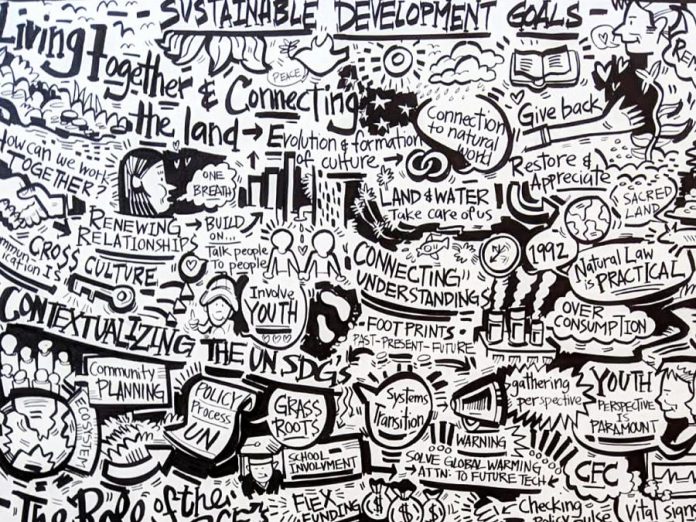
This is the first article in a three-part series about the United Nations’ Sustainable Development Goals (also called the 2030 Agenda).
In Part 1, we explain what the 2030 Agenda is and how the Kawartha World Issues Centre (KWIC) and GreenUP are working together to advance the agenda locally.
On the cusp of 2021, I’m reflecting on the importance of the next decade for improving the health and well-being of all life on Earth. Time is of the essence. COVID-19 has contributed to the first increase in global poverty in decades, and scientists warn that we must massively reduce global greenhouse gas emissions by 2030 to prevent catastrophic climate change.
The United Nations’ 2030 Agenda for Sustainable Development offers a way to navigate these interconnected crises. It is an ambitious global plan to “free the human race from the tyranny of poverty and want, and to heal and secure our planet.”
The 2030 Agenda: 17 goals for sustainable development
Haven’t heard of this 2030 Agenda? You’re not alone. A survey conducted by the World Economic Forum in 2019 found that just 51 per cent of Canadians are aware of the 2030 Agenda and its Sustainable Development Goals (SDGs), well below the estimated global rate of awareness of 74 per cent.
The 2030 Agenda was adopted by the United Nations general assembly in 2015. It is a framework of 17 interconnected goals ranging from ending poverty to combating climate change. The Millennium Development Goals focused on the development of the Global South and served as the predecessor to the SDGs. Unlike the Millennium Development Goals, the SDGs apply to every nation around the world.
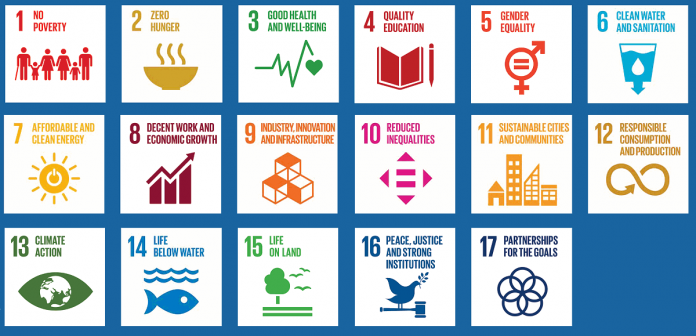
I like to think of the 2030 Agenda as a forest, where each SDG is a unique tree that is integral to the whole. In a forest, trees are only as healthy as the soil that feeds them.
Equity is the soil that nourishes each of the SDGs and makes their achievement possible. The United Nations calls this underlying principle “Leave No One Behind.” In Canada, leaving no one behind means reckoning with the injustices facing Indigenous peoples, people of colour, people with disabilities, women and gender-diverse people, and others.
Connecting the global to the local
In 2019, local efforts to increase awareness about the SDGs kicked off with a community event hosted by the Kawartha World Issues Centre (KWIC), GreenUP, Fleming College’s Office of Sustainability, the Ontario Council for International Cooperation, Trent University, and the Regional Centre for Expertise.
This forum brought together 120 community leaders, politicians, students, and educators to learn more about the 2030 Agenda. Participants identified priorities for our region using collaborative activities and discussion.
“I enjoyed how we were able to get so many different groups of people, of different ages and backgrounds, to collaborate and prioritize these goals in Peterborough,” explains Faith Mwesigye, who helped organize the forum. “It was a good example of what can happen when different voices come together to listen and learn from each other.”

In 2020, KWIC was awarded federal funding to build upon the foundations established at that event, in partnership with GreenUP. We’ve formed five diverse and inclusive action teams to promote further action toward the 2030 Agenda while leaving no one behind.
Four of the teams are organized around specific goals: No Poverty (SDG 1), Quality Education (SDG 4), Clean Water and Sanitation (SDG 6), and Climate Action (SDG 13). The fifth group, called the Indigenous Leadership Action Team (ILAT), supports the work of the other four groups by bringing diverse Indigenous perspectives to each issue.
All five teams are connected to priorities identified at the 2019 Community Forum.
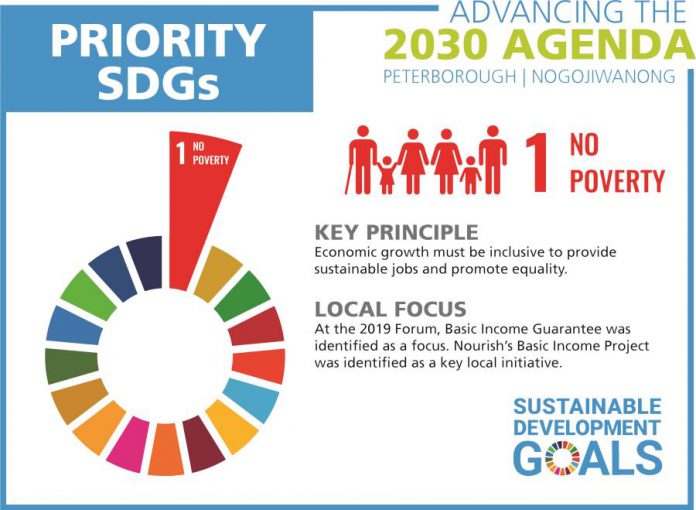

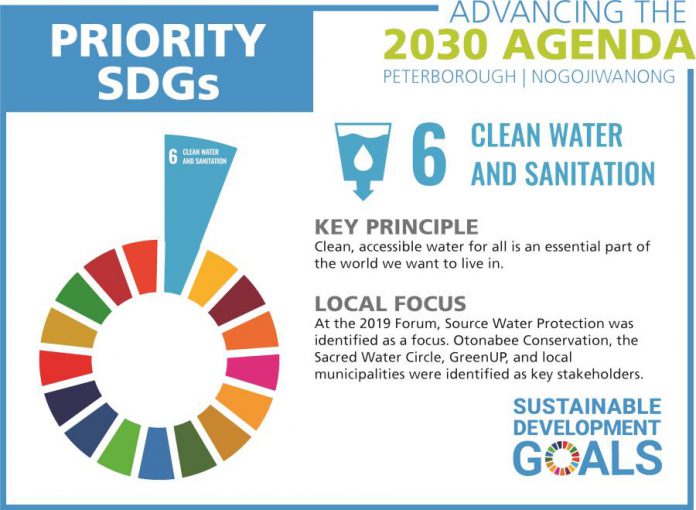
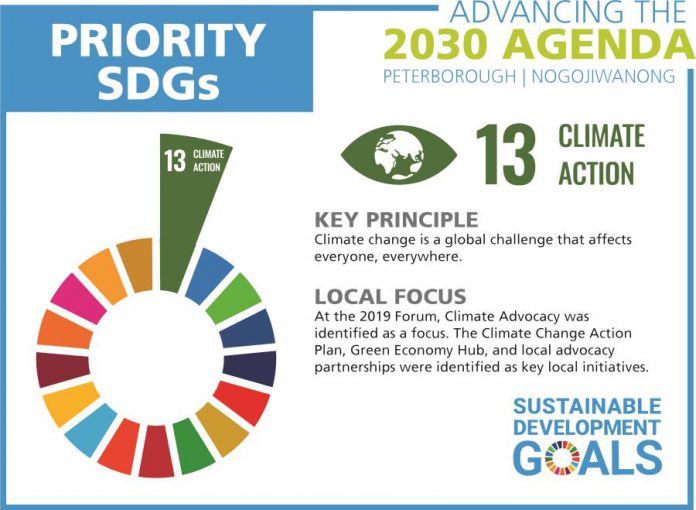

“Too often in Canada and within the SDGs, Indigenous peoples are the furthest left behind,” explains Shaelyn Wabegijig, one of the coordinators of the project and an Algonquin youth. “This work is about learning how to maintain good relationships between people and the natural world we are part of.”
“Michi Saagiig community members carry the knowledge of their ancestors to maintain good relationships in this place since time immemorial,” Wabegijig adds. “This is why it is so important for Michi Saagig community members to guide our work through the Indigenous leadership action team.”
In addition to the Indigenous leadership action team, two Indigenous consultants and an Elder advisor are supporting the SDG project as a whole.
On February 24 and 25, 2021, Advancing the 2030 Agenda in Peterborough Nogojiwanong will culminate in a second Community Forum. At this forum, Indigenous leadership and the action teams will share their work and discuss next steps in the spirit of leaving no one behind.
Coming up in February
Look for Part 2 of this series of articles in February. In that article, we speak with the project’s Indigenous consultants and Elder advisor to learn more about how Indigenous knowledge and leadership are guiding this work and promoting action toward the 2030 Agenda in a good way.
Advancing the 2030 Agenda is funded through the Government of Canada’s Sustainable Development Goals Program. For more information about the project and our 2021 Community Forum, please visit greenup.on.ca/sdg/.


